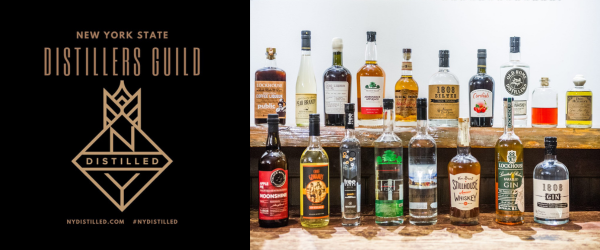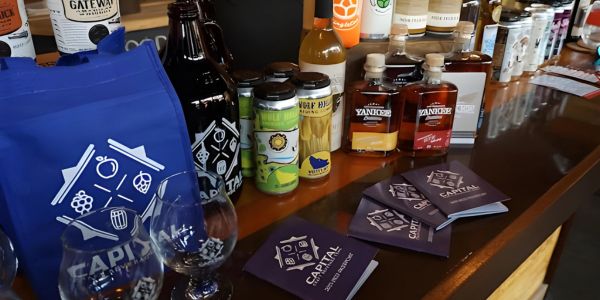
08/03/2024 Crafting a Path to Success Through Legislation, Collaboration, and Artisanal Innovation
In the dynamic world of spirits, New York State is experiencing a renaissance in its distilling industry. Teresa Casey, the Executive Director of the New York State Distillers Guild has over two decades of experience in association management, government affairs, and policy analysis. She is a key player in shaping the landscape for craft distilleries. This interview delves into the unique factors fueling the industry's growth, legislative initiatives, and the evolving trends set to define the spirits market in New York in 2024.
The New York distilling industry has experienced a notable resurgence in recent years. What factors do you attribute to this revival, and how has it impacted the global perception of New York spirits?
The distilling industry in New York was born from a few people who had no roadmap but persevered through passion, trial, and error. They were not following a trend, but rather their hearts and a belief they could make something on their own.
Our industry has been fortunate that a rise in consumer demand for local products made in socially and environmentally sound ways has paralleled our timeline. Our distillers’ commitment and passion are evident in the bottles, and many of those bottles have been recognized as among the world’s best.

Image: New York State Distillers Guild
As the Executive Director of the New York State Distillers Guild, can you share some insights into the unique marketing, legislative, and regulatory goals that the guild works towards to support the craft distilling industry in the state?
Our goal is to be the voice of the industry. Our members gather annually and lay out the public policy priorities for the Guild.
We seek parity among all New York State alcoholic beverage manufacturers. Whether it’s spirits, beer, cider, or wine – alcohol is alcohol and all manufacturers deserve the same regulatory treatment and access to markets.
Our prime focus has been the legislative authority for distillers to ship directly to consumers (DtC), which wineries have had for nearly 20 years with no detriment to public safety or the fiscal health of retailers.
We had a win in 2023 when our New York State Legislature enacted parity for distillers in an alcoholic beverage production credit, which will generate meaningful savings that our distillers can invest back into their distilleries. An economist’s analysis -- based on data including a survey of our members -- projects that the credit will generate more than $2.21 for every dollar (on net) refunded to craft distillers.
Parity is always our theme. We simply seek a level playing field.
Your involvement in the "Ship My Spirits" campaign reflects efforts to bolster the NYS spirits marketplace. Direct-to-consumer shipping can benefit both consumers and small distillers in the state. What challenges does the industry face in achieving this goal?
The biggest challenge New York State manufacturers and craft distillers across the country face is that alcohol e-commerce is not subject to the state and federal licensing requirements and other regulations governing just about every aspect of the industry. State laws and regulations largely did not anticipate the development of national technology platforms that would facilitate shipping from wine and liquor stores.
Tech companies backed by wholesalers are creating a new “fourth tier,” yet they are subject to no alcohol regulations. Their loophole allows them to charge retailers ten percent or more on sales made using their networks, and retain customer data – all without oversight by alcohol regulators.
Retail, wholesale, and manufacturing licensees are subject to robust disclosure requirements relating to ownership and financials. These requirements ensure compliance with tied-house and other laws and regulations. The e-commerce platforms have no such requirements.
No state alcohol regulator was able to act when Drizly was subject to a 2.5 million consumer data breach in 2020 – because there was no alcohol license involved.
Enactment of DtC for manufacturers will create a legal framework for the interstate shipment of alcohol – modeled on the nearly 20-year-old wine shipping framework --- that ensures appropriate transparency and sales tax collections and payments. It will close the loophole that allows e-commerce platforms to operate without state or federal oversight.

Image: New York State Distillers Guild leading trade associations representing distillers large and small, joined forces to launch "Ship My Spirits,"
At least one state, Illinois, has introduced legislation to regulate the “fourth tier.” We hope others will follow to ensure the protection of consumers, retailers, and the market access consumers want and manufacturers need to survive in a market that is stacked against them.
Has there been any progress on the NY legislature’s consideration of these bills?
We have very strong support from key legislators in New York, but we are a young industry and our opponents have had decades to accumulate political capital.
We know consumers want and deserve access to our products, which is extremely limited via traditional retail stores, due to the basic realities of physics and shelf space. We all love our retail store partners. As consumers, we would all rather walk or drive to our neighborhood wine and liquor store to buy quality New York State products. But we also know that those stores only have so much shelf space, and most cannot possibly showcase the full depth and range of world-class spirits produced in New York.
We are working to cultivate consumer support, which was essential when New York’s wine sector was authorized to ship DtC nearly two decades ago.
All we want is the same authority wineries have to ship – safely and with all tax obligations met – directly to our consumers who can’t otherwise get our products.
The future of New York distilling hangs in the balance.
The New York legislature is considering bills related to direct shipping for distillers and cideries. Can you elaborate on the significance of these bills (S4245-A/A3275-A and S556/A2513) and how they could impact the industry if passed?
Our lobbying efforts are focused on S4245-A/S2852-A, which would authorize DtC shipping for distilleries and cideries.
The bills mirror the wine DtC shipping framework that has been in place since 2005. Our goal is to have parity among all alcohol manufacturers licensed in the state.
The wine industry has bloomed in New York – as DtC has allowed small producers to reach their customers across the U.S. Tourists who purchase their products can ship them home, as well as join wine clubs. DtC has been critical for the New York wine industry, and we just want to follow that proven roadmap to help our industry survive and grow.
The Ship My Spirits campaign emphasizes the economic impact and job creation potential of direct shipping for the spirits industry. How has the temporary allowance of spirits DTC shipping during the pandemic shaped perceptions and support for this initiative?
The temporary allowance was a godsend. Craft spirits are often a “hand sell,” so our distillers were hanging on by a thread. The allowance of DtC and cocktails to-go allowed us to reach our fans safely. During this entire period, our distillers proved that we can deliver safely and effectively. All this with no dent in retail sales – particularly of our New York State-made products.
Given your extensive experience in association management and government affairs, what advice would you offer to craft distilleries looking to navigate legislative challenges and advocate for positive industry changes?
My most important role as a lobbyist and association executive is to help my members tell their stories to the right people in government.
Legislators hunger (or thirst!) for ways to support their homegrown businesses, especially businesses like distilleries, which sit at a crossroads of tourism, hospitality, agriculture, and manufacturing. We have found many legislators were not even aware that spirits were one of the very few products they could not just order online for home delivery.
Nothing is more compelling to a legislator than hearing directly from a business person – particularly in their district – about their real challenges and other aspects of their stories.
In addition to live interpersonal engagement, I always recommend collaboration where possible. Many of the toughest legislative hurdles have been met with alliances, sometimes surprising ones.
In the case of DtC, we are working with colleagues in the wine sector, which already enjoys DtC, and with the cider sector, which would get the authority with the enactment of the legislation we have prioritized, and with the support of the brewing industry. We also enjoy the support of agricultural organizations, tourism bodies, and of course consumers.
I would also suggest hiring a lobbyist if at all possible. If that is beyond an organization’s budget, find sympathetic advocates who can help you. Your state’s Farm Bureau or other agricultural organizations might have staff lobbyists who will help, and maybe even make your priorities part of their priorities. There are some key “Lobbying 101” rules in every state, and it’s helpful if you can get insight regarding legislative committees of jurisdiction, likely sources of opposition, and the dynamics in your state’s legislature on alcohol policy.
The Capital Craft Beverage Trail includes various fermented beverages like beer, wine, cider, and spirits. How does collaboration within this diverse beverage community contribute to the overall success of craft producers in the region?
The Capital Craft Beverage Trail’s strength derives from the fact that it was truly conceived and built by local producers here in New York State’s Capital Region. They knew they wanted to build a strong marketing program in the shape of a Passport.
The Passport and the Trail’s signature tasting events, which take place in museums around the region, benefit from that diversity of products. The Trail sees lots of evidence of consumers collecting their Passport “stamps” in groups. When your marketing vehicles include beer, wine, cider, spirits, mead, and even kombucha, odds are better that there will be something for everyone in a group of friends filling their Passports together or attending a “Drink” tasting event.
Trail Producer members also enjoy the camaraderie of membership, which brings together makers of different products from different corners of our regional footprint. I’ve seen special cocktails and other collaborations that have emerged from conversations at Trail events.

Image: Capital Craft Beverage Trail
With 20 years of experience in association management, what strategies do you find most effective in helping trade associations, like the New York State Distillers Guild, achieve their goals efficiently and well?
The most important thing a trade association can do for its members is marshall the talents, brainpower, and other strengths of its members.
Lobbying and association work are not part of the everyday lives of most association members, particularly in the craft beverage sector.
An association can help its members meet their goals by developing consensus on key issues -- sometimes laying aside issues that are contentious among the membership – developing messaging themes and action plans, and providing members with the tools to tell their stories, whether in a public policy context or in marketing.
The association’s job is to help the membership work together to do what it needs to get done.
As a speaker at the International Bulk Wine & Spirits Show in San Francisco on July 23 & 24, what insights or key messages do you plan to share with industry professionals? How do you see this experience contributing to the broader discourse on craft-distilling trends and innovations?
I plan to focus on ways having a strong Guild can work for the benefit of the industry in public policy, marketing, and education.
Those three areas intersect in all kinds of ways, including the need for state and federal laws and regulatory structures that promote small businesses and innovation while protecting consumers.
A strong Guild can facilitate relationships among a state’s distilleries. It can provide a context or sometimes a physical venue for the dedicated craftspeople who are the nation’s distillers to gather and share ideas and information.
There’s no measuring how much great work has been born of gatherings of hardworking luminaries like the craft distillers I have the pleasure of representing.
The diversity of artisanal spirits in New York is expanding rapidly. What trends and innovations do you foresee in the state's distilling industry for 2024 and beyond?
I’m cautiously optimistic that our Legislature will enact DtC shipping and enable our distillers to reach their markets and their full potential. The state worked hard to make it possible for small distillers to exist in the modern era, and we hope they won’t let the sector fail due to misrepresentations by hidden forces.
Expanded market access via manufacturer DtC can’t help but foster expansion of production and development of new products.
Our New York State Distillers Guild is fortunate to enjoy marketing support from our state government, which will enable us to execute key marketing projects this year, including a statewide Passport to encourage distillery visits and support for member participation in events where we can show off our amazing range of world-class products.
[[relatedPurchasesItems-31]]
Conclusion:
As we navigate the terrain of New York's distilling industry, Teresa Casey's insights offer a compelling glimpse into its vibrant future. From the diverse array of artisanal spirits to legislative endeavors like the "Ship My Spirits" campaign, Casey's leadership at the helm of the New York State Distillers Guild is pivotal. The anticipation for the continued innovation and success of the craft distilling industry in the Empire State remains high, guided by the expertise and passion of industry leaders like Teresa Casey.
In conversation with Malvika Patel, Editor and VP, Beverage Trade Network
2025 Registrations are now closed


